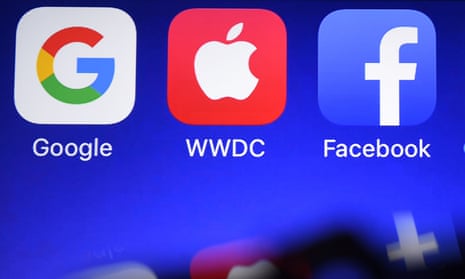A tax on digital companies including Google and Facebook has won Senate support, with Centre Alliance holding out the prospect that revenue-raising measures could help reverse its opposition to company tax cuts.
While Labor has expressed in-principle support for the measure, it warned on Monday against the crossbench being bought off by a “low-revenue” measure on digital profit-shifting as a bargaining chip to pass big business tax cuts.
As parliament resumed on Monday the government was still seeking two more Senate votes to pass $35bn in tax cuts for companies earning more than $50m a year and preparing for a stoush on the personal income tax cuts announced in the budget.
With independent Tim Storer calling for broader reform to win his support for company tax cuts, the Coalition has shifted focus to the Centre Alliance’s two Senate votes as the pathway to pass the package.
On Monday senator Stirling Griff said the Centre Alliance supported a tax based on digital companies’ turnover to help combat the use of transfer pricing to minimise tax paid in Australia.
Digital giants including Google, Apple and Microsoft have long defended structures that allow them to pay tax in lower-taxed jurisdictions such as Singapore on revenue generated in Australia.
Despite the Centre Alliance’s stated opposition to the second tranche of company tax cuts, Griff told Guardian Australia if there was “significant additional revenue and we knew that there would be no cut in core government services, we’d be happy for everybody to pay less tax”.
He said the proposed digital tax was “just one factor” but “as a general statement if the government coffers are going well and core services are assured we’d consider any options” for tax relief.
“We have to be assured that the debt is going to be paid down and the government will deliver good surpluses so there are no potential cuts if the economy goes pear-shaped,” he said.
“Maybe a digital tax is a component of it – but the government still has a fair way to go to raise sufficient revenue to overcome any potential downturn as a result of weaker growth in China or our own economy in the next 12 months.
“We’re not actively negotiating with them. By 1 July maybe [the company tax cut] can be done, maybe it can’t, we need to see the detail.”
Griff noted the government had not released any detail on the digital tax, nor proposed changes to the petroleum resource rent tax (PRRT). A spokesman for treasurer Scott Morrison said the treasury was still developing options for the digital tax.
Reports in the Australian and Fairfax Media suggested options under consideration included a 3% tax on all advertising revenue from globally significant enterprises with annual turnover of more than $1bn or a GST-style levy on paid advertising.
India has placed a 6% withholding tax when Indian merchants pay to advertise on foreign websites, which collected US$87m and $90m in its first two years. The European Union has proposed a 3% levy.
The shadow assistant treasurer, Andrew Leigh, said everyone accepted a digital levy as a “stop-gap” while an international agreement was developed to deal with profit-shifting more broadly.
He said the government needed to develop a “coherent package” and “long-term strategy”.
Leigh criticised “the idea [the crossbench] would trade this for an $80bn company tax cut” because “even its advocates in their wildest dreams would say it will raise nowhere near that amount”.
He said the crossbench had to be aware that this is a “low-revenue measure to fool them into voting for a massive corporate tax cut”.
Last week a report in the Australian Financial Review suggested the Coalition had held off announcing a plan to toughen allowable deductions for the PRRT for fear that One Nation would use its votes in support of company tax cuts to leverage bigger changes to raise more revenue from oil and gas companies.
Although One Nation has already pledged support for the company tax cuts, it has also made demands for greater revenue-raising through the PRRT. In November senator Peter Georgiou called for a uniform royalty of 10% on the well head value of gas.
